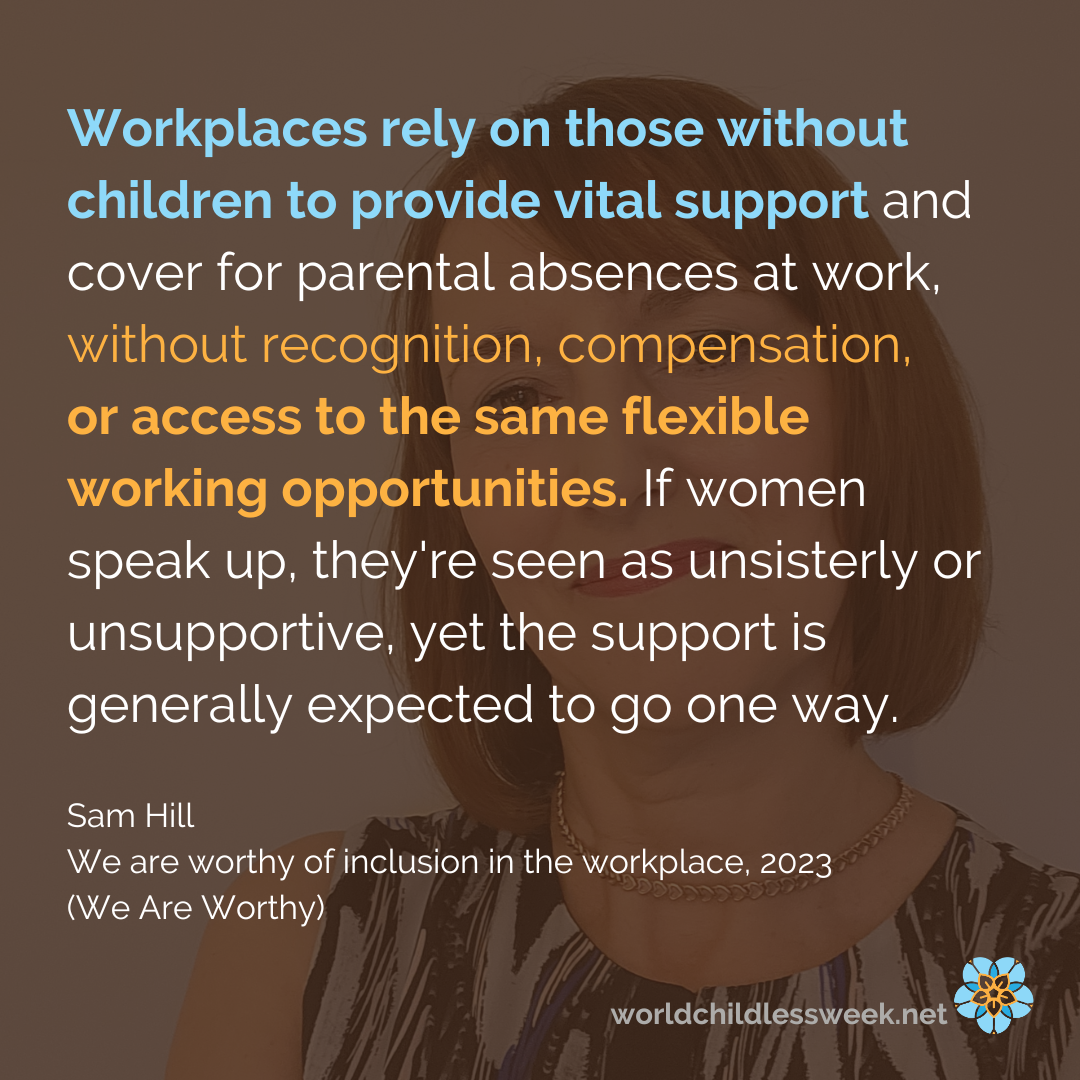Sam Hill
As childless people, we are worthy of being recognised, acknowledged and included in our workplaces.
Non-parents are an integral part of the workforce, and increasingly there are more of us. In the UK, 1 in 5 women remain non-parents permanently, and the numbers of men without children are similar or even higher. The Noon organisation research found that almost a third of professional women aged 45-60 have no children (60% childless/40% childfree).
Most organisations don’t realise how many of their staff are non-parents, or why childlessness is a diversity, equity, inclusion and belonging issue that needs their attention - if they want to attract and retain staff.
Our workplaces increasingly promote the narrative that every woman has, wants, or is able to have a child, and that parenthood is the ultimate goal and fulfilment, for women and men. This isn’t reflective of many people’s life experience, and can be incredibly exclusionary and painful for those who wanted but were unable to attain parenthood.
Whether it’s using parenting as a universal experience to illustrate training exercises, lunchtime clubs for ‘working mums’ (effectively excluding all other women), or ultrasounds/sonograms circulated on company networks, the promotion of motherhood (pronatalism) is everywhere in the workplace. This can be frustrating to those who have chosen not to have children, and devastating and alienating for those who are grieving their childlessness.
This becomes is an issue of inclusion, equity and belonging when:
* Managers promote International Women's Day with 'parent support resources' without acknowledging that 1 in 5 women are permanently childless.
* Managers openly hold baby showers or bring baby to work days to celebrate the attainment of motherhood, and it’s very difficult for women not to attend without being labelled as odd, bitter, envious or unmaternal.
* Professional women groups become ‘mum support’ groups, and those without children are effectively excluded.
* A company's internal diversity and inclusion site includes parent networks but no representation or support for childlessness.
* Team weekly catch-ups are dominated by parenting chat, and those without children can't participate. At your next weekly catch-up, look at those who are sitting silently. Is the conversation inclusive of their experience?
* A company's fertility policy doesn't offer support for those whose fertility journeys end without a child. The Chartered Institute of Personnel & Development (CIPD) has recently released a guide to offering workplace support which includes the need for ongoing support and references World Childless Week.
* The lack of awareness and support for involuntary childlessness and fertility journeys which end without a child mean that line-managers are not equipped to manage these issues, and may respond with insensitive comments (such as 'can't you just adopt'). HR and line-managers who may be experiencing these issues themselves may yet be expected to offer support around fertility treatments, maternity and parenthood.
* Parents are permitted to take time out informally to deal with child related issues, while non-parents are told they must use formal leave to manage important and impromptu personal demands. Many non-parents have caring responsibilities outside of work too, but are often not recognised or treated as important in the way that childcare issues can be. Workplaces often don't recognise that someone who lives on their own may rely on a non-kin network for support.
* Workplaces rely on those without children to provide vital support and cover for parental absences at work, without recognition, compensation, or access to the same flexible working opportunities. If women speak up, they're seen as unsisterly or unsupportive, yet the support is generally expected to go one way. This is an issue of resource planning, and by not addressing this, organisations are inadvertently creating unfairness and causing friction amongst their staff. Those most affected will leave for a more inclusive workplace. Organisations also rarely acknowledge that a long work hours culture can have a negative impact on the wellbeing of people without children too, particularly in solo households.
* Organisations encourage staff to bring their ‘whole selves to work’ and people share more about their children and family life. This means that the workplace is no longer a respite from parenting-related chat, which can perpetuate the exclusion of non-parent staff who may be unable or unwilling to engage. Whether chosen or not, non-parenthood is still judged as a somewhat deviant identity for adults, particularly women, and this can lead to shame and 'othering'.
It's also important to note - often parents are under supported in the workplace too and this isn’t at all suggesting taking support away from parents and their needs. But by encouraging more inclusive growth in our workplaces, with the recognition and support of HR professionals and line managers, we can grow inclusion to include the lives and experiences of parents and non-parents. Inclusive Employers, who run National Inclusion Week, recognise childlessness as an inclusion issue in the workplace, and as a commitment to creating truly inclusive workplaces, have added World Childless Week to their diversity calendar for 2023.
If you experience any of these situations at work, raise it with your diversity & inclusion or HR manager. As childless people our experience and contribution is valuable too. Often we are shamed into keeping quiet because our workplaces convey the narrative that childlessness is a taboo subject. By doing this they perpetuate the shame, othering and exclusion, and people continue to stay quiet.
We are worthy of our experience being included in the workplace. You can make a difference. Organisations that offer truly inclusive workplaces will become the employers of choice for the future.
Is your organisation worthy of you?
Sam with the support of Jody Day has created a template letter for you to use to ‘Request for Inclusion of World Childless Week in our workplace calendar’
We are Worthy of being acknowledged in the workplace, and together we can make a difference.


